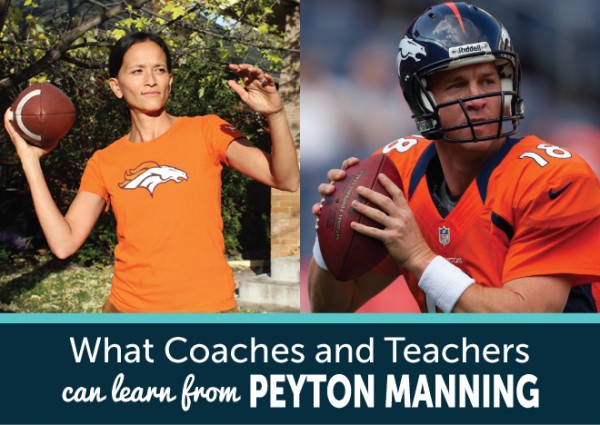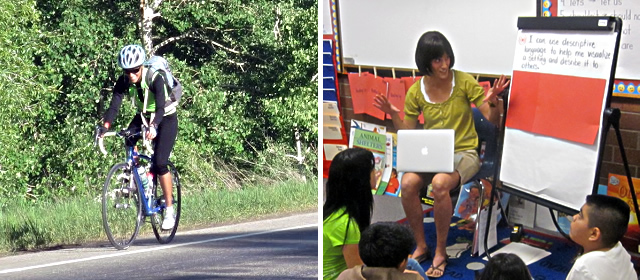What Coaches and Teachers Can Learn from Peyton Manning
Teaching TipsYou might not know this, but the Broncos and Peyton Manning have a BIG game coming up this weekend.
Yep. It’s us vs. the Packers, two 6 and 0 teams going head-to-head, Peyton vs. Aaron Rodgers. And guess what…the Packers are going dowwwwn!!!
I know what you’re thinking – okay Kristin, settle down now. We get that you like the Broncos and Peyton Manning. But what the heck does that have to do with coaching and teaching anyway??
Well, a whole gosh darn lot actually. Peyton’s work on and off the field provides some great insight into leadership traits that reach beyond the football field and into schools and classrooms and the work we do everyday.

In fact, Peyton’s spoken about these traits before, referring to them as ‘Game Changers.’ So let’s take a look at what they are and how we can use them to inspire our own work.
1. Learn to Thrive on Being Uncomfortable
Isn’t is great when everything is going just swimmingly?
Well, yeah.
But then what happens when it doesn’t?
Your principal wants to observe you, you just found out you have to facilitate a giant PD, or you were asked to work with that tricky teacher in the building…and all of a sudden, you become very, very uncomfortable.
It happens to Peyton all the time. An interception, a sack, an arena full of screaming football fans. But do you see him fall apart and hide behind the Gatorade table? Nope.
Because he knows that when he’s uncomfortable, he’s getting better.
So let’s take a lesson from Peyton.
Instead of running from those uncomfortable situations, let’s run towards them. Bring it on!
2. Devote Yourself to Intense Preparation
This is a big one for Peyton. Even though this is his 18th season in the NFL, he still works his
be-hind off like it’s his first year. Peyton reviews tape intensely, works out like a madman, and works to figure out all the variables so that on game day he is as ready as possible for whatever the opposing team may bring into the stadium.
And that’s how it should be for us too, especially since we have such a high stakes game to play everyday.
Make sure your lessons are tight, copies are made, and all materials are accounted for.
Make time to plan for your coaching convos – think through the focus questions you want to ask, anticipate what your coachee might say in response and how you’ll direct the conversation from there. Identify a small, actionable next step that will really make a difference
3. Be Prepared to Adjust
The reality is, that no matter how well planned you are, things won’t always go just as you had envisioned. And you’ll need to adjust.
The ability to adjust, is the ability to be responsive to whatever you may have observed or anything that has changed in the moment you’re in.
This is a skill, and it’s a good one to practice. Trust your instincts, your professional judgment, and make smart “in the moment” decisions to move your team (students/teachers) and yourself forward.
And this applies to bigger picture stuff too. There may be a change in leadership or a new curriculum to roll-out. Things are always changing, especially in education, but that’s ok.
We’re prepared to adjust.
4. Invest in a Coach
Since Peyton’s been playing so long, you’d think he wouldn’t need or want a coach anymore right? Nope.
As Peyton said in his Leadercast talk, “As soon as someone stops wanting to be coached, taught or mentored they are in trouble. The landscape of the sports field changes, just as the landscape of your business. Coaching keeps you on the top of your game.”
Say it Peyton!
And coaches, don’t forget – we need coaches too. Do your best to seek this out. Ask for feedback, learn from others, and keep working to get better.
5. Become a Master Observer
As coaches, we have the unique opportunity to visit several classrooms each week. To see different teachers deliver different lessons, and then watch how kids engage in the work.
As teachers, we have the special opportunity to be a part of a classroom full of unique learners, sorting through all kinds of different work and learning.
And there is so much to learn from each of these moments.
You just have to pay attention.
When you become a master observer in this way, as Peyton is, constantly seeking to figure things out, you’re able to gather so much super valuable “data” that will help you be a better leader for your team.
6. Build Relationships and Instill Trust
“Trust does not come from the position occupied by the leader. It is earned by example and over time.”
Oooo. That’s a tweet-able. Tweet tweet.
Building relationships and instilling trust is the foundation of all the work you do in classrooms and with teachers. Without it, you don’t have much.
So, what do you think – are you one of the Game Changers in your school?
Let me know which of these traits really hits home with you in the comments below.
For me…I’m not sure I’m Peyton Manning status yet, but I’m going to keep working at it.

And you better know I’ll be rocking my Peyton Manning jersey at school today, and also screaming loudly for a Broncos victory this weekend.
Go Broncos!!
![]()
P.S. If you thought this post was fun to read, and others might enjoy reading it as well, I would really appreciate it if you shared it with your friends using the buttons below. Thanks!
P.P.S If you don’t like Peyton Manning or the Broncos…say what??!! But ok, fine. We can still be friends. Maybe just not this weekend :)

